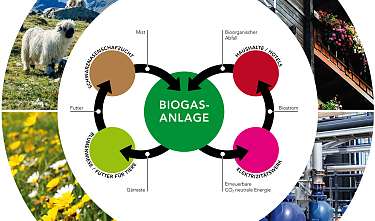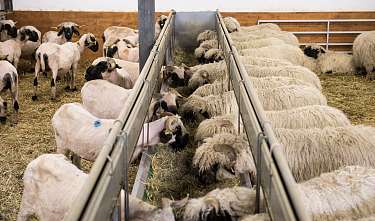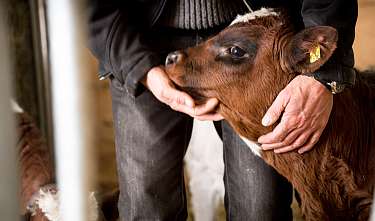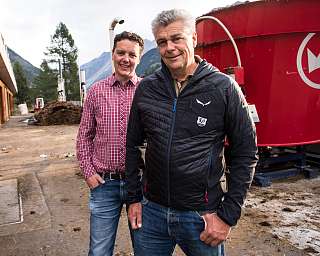Sustainability
Tradition Julen has been working on tangible sustainability for many years, here we have a small overview of what this means:
Hotels
- The hotels are equipped with state-of-the-art technology: LED lights, modern appliances, new ventilation system with heat recovery, modern efficient heating systems, intelligent building control systems, refrigeration systems with heat recovery, electric hotel taxis.
- We will continue to invest in real estate on an ongoing basis to reduce our ecological footprint.
AGRICULTURE
SHEEP BREEDING
- The sheep favour biodiversity in the Alps through summering. They contribute to the fact that the few alpine pastures here in Zermatt remain green and cultivable and thus ultimately also provide more food for the wild animals.
- In this way, the sheep also contribute to greater safety, as they protect against wildfires which could cause the loss of protection forests.
- The sheep produce dung from which energy is produced in the biogas plant and which ultimately ends up back on the meadows. In this way we return phosphorus to the soil, an important element whose natural occurrence on earth is limited.
- We have valuable, healthy meat from the sheep. It has been proven that the meat of our black nosed sheep contains Omega 3 fatty acids due to the high alpine summering and is therefore particularly valuable. The fur, wool and horns of the animals are also used in our businesses. It is a special concern of ours to use the whole animal, not only the fillets and the lamb racks - we see this as our responsibility towards the animal that gives its life for us. But until that time, we guarantee species-appropriate, extensive animal husbandry in which animal welfare is the main focus.
COWS
- We receive valuable mountain milk from the cows. In summer, alpine cheese is produced, in winter here in Zermatt the Tradition Julen Raclette cheese!
- The milk is processed into cheese and other products (yoghurt etc.) in Zermatt in the Horu cheese dairy of Reto and Mirijam Gobba. The two are friends of the family and keep some animals themselves which stand together with ours in the Tradition Julen stable. They are always actively helping in the agriculture.
BIOGAS PLANT
- This ambitious and trend-setting project by Paul Julen has been running since 2014.
- 1'600 tons of bioorganic waste (mostly food from tourism) are fermented here annually together with the dung of the cows and sheep.
- A biogas is produced, which drives a motor, which in turn drives a generator, which in turn produces CO2-neutral electricity for a calculated amount of about 350 Swiss families.
- CO2 neutral, because the process of combustion converts methane gas into CO2, which is 22 times less harmful to our atmosphere and because all raw materials for this energy production are natural and renewable.
- After the process, a biological fertilizer remains, which is returned to the fields in Zermatt but also partly down in the Rhone valley and thus the cycle is closed and the output is positive in every case!
We go one step further! Tradition Julen Zermatt also stands for sustainability, here you will find our current projects:

Re-Use-Me Slippers
Welcome to our eco-conscious hotels, where together we can make a positive impact on sustainability, waste and the environment!
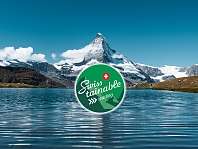
Experience Zermatt sustainably...
Tradition Julen Zermatt is Swisstainable "Leading" certified!
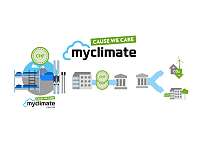
Myclimate - cause we care
With your voluntary contribution to climate protection, you compensate for all CO2 emissions of your stay and at the same time promote local sustainability measures on site. At the same time we double your contribution...
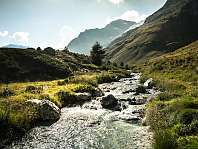
Zermatt mountain water
Fresh mountain water for our restaurants...
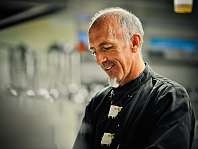
Food Waste reduction
Together with the start-up company Kytro, we use the latest technology with artificial intelligence to determine where and when how much food waste accumulates...
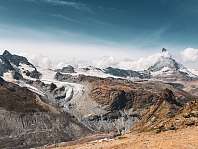
Environmental certification 14001
Tradition Julen takes its responsibility as an employer seriously by systematically embedding the topic of environmental management in all processes and procedures of the company...
We have long been committed to sustainability
